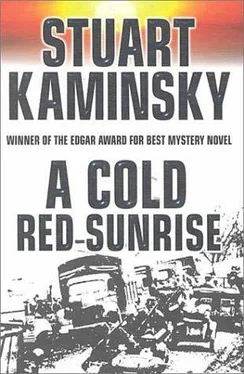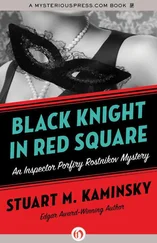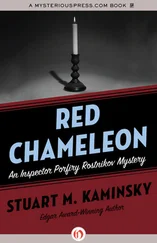Stuart Kaminsky - A Cold Red Sunrise
Здесь есть возможность читать онлайн «Stuart Kaminsky - A Cold Red Sunrise» весь текст электронной книги совершенно бесплатно (целиком полную версию без сокращений). В некоторых случаях можно слушать аудио, скачать через торрент в формате fb2 и присутствует краткое содержание. Жанр: Полицейский детектив, на английском языке. Описание произведения, (предисловие) а так же отзывы посетителей доступны на портале библиотеки ЛибКат.
- Название:A Cold Red Sunrise
- Автор:
- Жанр:
- Год:неизвестен
- ISBN:нет данных
- Рейтинг книги:4 / 5. Голосов: 1
-
Избранное:Добавить в избранное
- Отзывы:
-
Ваша оценка:
- 80
- 1
- 2
- 3
- 4
- 5
A Cold Red Sunrise: краткое содержание, описание и аннотация
Предлагаем к чтению аннотацию, описание, краткое содержание или предисловие (зависит от того, что написал сам автор книги «A Cold Red Sunrise»). Если вы не нашли необходимую информацию о книге — напишите в комментариях, мы постараемся отыскать её.
A Cold Red Sunrise — читать онлайн бесплатно полную книгу (весь текст) целиком
Ниже представлен текст книги, разбитый по страницам. Система сохранения места последней прочитанной страницы, позволяет с удобством читать онлайн бесплатно книгу «A Cold Red Sunrise», без необходимости каждый раз заново искать на чём Вы остановились. Поставьте закладку, и сможете в любой момент перейти на страницу, на которой закончили чтение.
Интервал:
Закладка:
"I'm sick but I'm not deaf," the old man said. "I heard things that happened. I remember seeing Kurmu."
"He didn't command a demon to kill Commissar Rutkin," said Rostnikov.
"I know that," said Mirasnikov irritably, and then he called to his wife, "Food. I need food, old creature." And then to Rostnikov again. "And I know that Dr. Samsonov didn't kill him either. How do you like that?"
"I am aware of that too," said Rostnikov.
"You are… All right. All right. Lean over here and I'll tell you something you didn't know. I'll tell you who your killer of Commissars is," croaked Mirasnikov.
And so Inspector Rostnikov leaned forward, smelling the bitter warmth of the brew on Mirasnikov's breath, and listened to the old man's whispered information, information which did not surprise him in the least.
"So, what are you going to do?" Mirasnikov said when Rostnikov stood up. "Go. Go make your arrest. End this. Get out of my town. It may be a frozen hell here in the long winter and a bog of insects in the short summer, but no one tries to kill me when you are not around."
"We will be going soon," said Rostnikov. "Very soon."
The old woman came hurrying back with two plates of food, small pieces of meat cooked soft, potatoes, beans.
"Well," grumbled Mirasnikov. "You might as well eat something before you go. Sit down."
So Rostnikov sat and thought and ate. Immediately after the hearing, Ludmilla Samsonov, her eyes moist, holding back tears, had asked Rostnikov to please let her speak to him as soon as possible. Rostnikov had nodded his agreement uncomfortably knowing that the woman would probably plead for her husband.
The first confession of the day came when Rostnikov returned to his room an hour later after hearing Mirasnikov's accusation. Karpo was busily preparing reports in his room. Sokolov was off somewhere, probably, thought Rostnikov, trying to talk the naval officer into letting him use the phone.
Rostnikov wasn't surprised to find General Krasnikov standing at the window in full uniform, his coat neatly draped over his left arm.
"I've come to confess," the general said.
"Please take a seat, General," said Rostnikov who had left his coat, hat and boots inside the downstairs door. "I'll sit on the bed."
"I'd prefer to stand," Krasnikov said.
"So I have noticed," said Rostnikov sitting on the bed, feeling the twinge in his leg.
"I killed Commissar Rutkin," the general said.
"Yes."
"That is all. I killed him."
"Would you tell me why you killed him?" Rostnikov asked reaching for the pillow and hugging it to his chest.
"He was an insulting, meddling bureaucrat," said Krasnikov.
"If we were to murder all the insulting, meddling bureaucrats in the Soviet Union, we would have to issue new incentives for women to replenish the depleted population," Rostnikov said.
"I killed him. This is a confession and I demand that you release Samsonov immediately," the general insisted.
"Would you still confess if I said that we would confiscate all of your property immediately and search through Samsonov's possessions the moment you were arrested?" asked Rostnikov. "Would you like some tea? Everyone in Tumsk has been filling me with tea for two days. I'd like the opportunity to return the favor."
"No tea," said Krasnikov. "Arrest me. I demand, as a Soviet citizen, to be arrested for murder."
"You did not kill Commissar Rutkin," said Rostnikov, leaning over to scratch the bottoms of his feet through his thick wool socks. "I know who killed Rutkin."
Krasnikov paused, looked at the man on the bed scratching his feet and said, "I don't believe you."
Rostnikov shrugged.
"Nonetheless, I know, and the killer is not you."
He stopped scratching, started rubbing, and went on.
"I admire your patriotism and conviction, however, Comrade General. To be willing to spend one's life in prison or possibly to be executed for one's beliefs is indeed admirable. One might guess, and mind you I am not doing so, that somewhere among the belongings of Lev or Ludmilla Samsonov is a manuscript, and that a military man who wrote that manuscript would do a great deal to get that manuscript carried to the West among the belongings of a notable dissident whose belongings are not likely to be searched carefully by a government wishing to let him leave as a sign of conciliation with the West. Does that not make sense?"
"Perhaps," agreed Krasnikov.
"In what form would you guess this manuscript would appear? I know it does not exist but if it did?" Rostnikov asked leaning back against the wall.
Krasnikov looked out the window, bit his lower lip and paced the small room once, from the window to the wall and back to the window where he turned to Rostnikov who looked up at him attentively.
"You have a son in Afghanistan?"
"I have."
"And you agree that the military operation there is improper for political, economic and humanitarian reasons?"
"I do," said Rostnikov.
"I am concerned primarily with the military error," Krasnikov said, looking as if he were about to resume pacing. "If I were to try to have a manuscript-length work carried out of the country by a departing citizen, a citizen who might not want to carry such a document, I would go through the painstaking process of actually printing one copy of the manuscript in book form and have it covered, bound and titled, probably giving it a title which an airport inspector or even a KGB officer would be likely to ignore."
"Printing one copy of a book would be most difficult, require special printing equipment, binding equipment," said Rostnikov, his eyes never leaving his visitor.
"It would probably take a year to do using crude equipment," said Krasnikov.
"And the idea would be that instead of hiding the manuscript, one disguises it and puts it in plain sight," said Rostnikov. "Clever."
"A traditional military tactic," said Krasnikov. "But it does no good if the carrier does not cross the border."
"Perhaps a miracle will happen very soon," said Rostnikov. "Perhaps a new killer will be identified and Samsonov will be freed and urged to leave the country within the week as he was scheduled 'to do."
Krasnikov examined the bland, flat face of the policeman and smiled.
"Then we will have to hope for a miracle," he said.
"Do you still wish to be arrested for murder?" Rostnikov asked.
"There seems to be a slight hint of sun this morning," said Krasnikov. "Perhaps I won't confess today."
The general moved to the bed and held out his right hand. Rostnikov took it.
"Forgive me for not rising, Comrade."
"Forgive me for underestimating you," Krasnikov responded.
"Always a tactical error," said Rostnikov.
"Just as Tolstoy said in his Military Strategy Through History," said Krasnikov releasing the inspector's hand.
"A book I should read some day," said Rostnikov with a sigh.
"Let's hope you do," said the General moving to the door. "Good morning."
It was Rostnikov's belief that only one copy existed of Tolstoy's Military Strategy Through History and that copy had most definitely not been written by Tolstoy. The general left the room, closing the door gently behind him. Rostnikov listened to his booted feet move across the short hall and down the stairs. When the outside door closed, Rostnikov sensed rather than heard another movement in the house and then a light knock at the door.
"Come in, Emil," he called, and Karpo entered the room dressed in black trousers, shoes, and a turtleneck sweater, and carrying a thick sheaf of papers. Rostnikov looked up. "Emil, how is it that you never need a shave?"
"I shave frequently, Comrade Inspector," Karpo said.
"Good," sighed Rostnikov, putting his feet on the floor and reaching out to accept Karpo's report. "I feared that you had found a way to remove facial hair but once in your life so you would not have to spend time removing it, time you could be spending at work."
Читать дальшеИнтервал:
Закладка:
Похожие книги на «A Cold Red Sunrise»
Представляем Вашему вниманию похожие книги на «A Cold Red Sunrise» списком для выбора. Мы отобрали схожую по названию и смыслу литературу в надежде предоставить читателям больше вариантов отыскать новые, интересные, ещё непрочитанные произведения.
Обсуждение, отзывы о книге «A Cold Red Sunrise» и просто собственные мнения читателей. Оставьте ваши комментарии, напишите, что Вы думаете о произведении, его смысле или главных героях. Укажите что конкретно понравилось, а что нет, и почему Вы так считаете.












